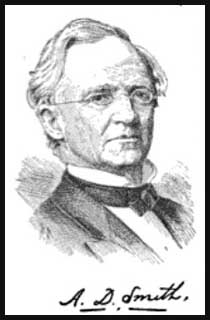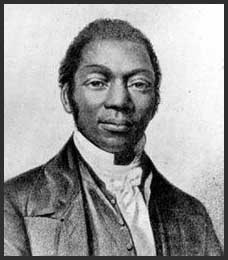Back When Presbyterians Seemed to Run Everything
Dartmouth College, located in Hanover, New Hampshire, was founded in December of 1769 (We will mention in passing that Samuel Miller was born that same year, less than two months earlier). Eleazar Wheelock served as the first president of the school and when he died in 1779, his son John Wheelock took up the mantle and served as the second president of Dartmouth. From there, the succeeding list of presidents came to be known as the “Wheelock Succession.”
Francis Brown was next called from his church in North Yarmouth, Maine, serving as the third president (1815-1820), during a particularly interesting crisis for the school. It was at this time that a legal challenge to the school arose, eventually coming before the Supreme Court. This was the famous Dartmouth College Case:
“The contest was a pivotal one for Dartmouth and for the newly independent nation. It tested the contract clause of the Constitution and arose from an 1816 controversy involving the legislature of the state of New Hampshire, which amended the 1769 charter granted to Eleazar Wheelock, making Dartmouth a public institution and changing its name to Dartmouth University. Under the leadership of President Brown, the Trustees resisted the effort and the case for Dartmouth was argued by Daniel Webster before the U.S. Supreme Court in 1818. Chief Justice John Marshall wrote the historic decision in favor of Dartmouth College, thereby paving the way for all American private institutions to conduct their affairs in accordance with their charters and without interference from the state.”
But the whole affair was taxing and Rev. Brown died at the young age of 35. His successor, the Rev. Daniel Dana, lasted just one year before he too was worn out and resigned the post. Bennet Tyler and Nathan Lord, the next two presidents, faired better. While Tyler served just four years, Nathan Lord’s term as president ran from 1828 to 1863. His term might have run longer, but as events unfolded in the 1860’s, the Trustees of Dartmouth were forced to finally deal with the fact that the school’s president was a strong pro-slavery advocate.
 So it was that in 1863, the Rev. Asa Dodge Smith became the seventh president of Dartmouth College. Inaugurated in 1863, he served as president until his death on August 16, 1877, at the age of 73.
So it was that in 1863, the Rev. Asa Dodge Smith became the seventh president of Dartmouth College. Inaugurated in 1863, he served as president until his death on August 16, 1877, at the age of 73.
Asa Dodge Smith was born in Amherst, Massachusetts on September 21, 1804, the son of Dr. Roger and Sally (Hodge) Smith. He was himself a graduate of Dartmouth College (1830), and in the year or so following graduation he worked as the principal of an academy in Limerick, Maine. Preparing to enter the ministry, he studied at Andover Theological Seminary and graduated there in 1834. He was then ordained and installed as pastor of what was then the Brainerd Presbyterian church (later renamed as the 14th Street Presbyterian church) in New York City. Rev. Smith also served as a professor of pastoral theology at the Union Theological Seminary, NY, 1843-1844.
From here, the history states that,
“After the forced resignation of Nathan Lord in 1863 over his support for slavery, the Trustees wanted a more conservative president to take his place. As a preacher for 29 years at the 14th Street Presbyterian Church in New York City, Asa Dodge had developed a reputation as a religious man with abolitionist beliefs.
“Smith’s presidency was a period of great growth for the College, including the establishment of two new schools within Dartmouth. The New Hampshire College of Agriculture and the Mechanic Arts, later moved to Durham, New Hampshire and renamed the University of New Hampshire, was originally founded in Hanover in 1866. One year later, the Thayer School of Engineering was founded. Over the course of his presidency, enrollment at the College was more than doubled, the number of scholarships increased from 42 to 103, and Dartmouth benefitted from several important bequests.”
Some of the honors conferred on the Rev. Asa Dodge Smith during his lifetime included the Doctor of Divinity degree, awarded by Williams College in 1849, and from the University of New York he received the Doctor of Letters degree in 1854. It was also during his tenure that the school celebrated its centennial anniversary, a momentous time nearly ruined by an unexpected thunderstorm. But ultimately the affair was not ruined for the participants, with attendees including Supreme Court Justice Salmon P. Chase, from the Class of 1826, and U.S. General William Tecumseh Sherman.
Words to Live By:
Perhaps covenant faithfulness is the lesson to take away from this account. A life lived apparently without amazing exploits or heart-rending stories, but lived faithfully before the Lord, using his God-given gifts and talents to the best of his ability, and all for the glory of God. So too most Christians live fairly average lives, undistinguished except for this one vital thing: Because of the finished cross-work of Jesus Christ, each one of His blood-bought children stands in a living, vital relationship with the God of creation, the Lord of all glory. On the surface, our lives may seem quite average, but the reality is far more exciting, far more glorious than even we can imagine.
Q. What is the chief end of man?
A. Man’s chief end is to glorify God and to enjoy Him forever.
So, whether you eat or drink, or whatever you do, do all to the glory of God.—1 Corinthians 10:31, ESV.
For Further Study:
To view the grave site of Rev. Smith, click here.

 “I am an American to the Backbone.”
“I am an American to the Backbone.” Guest author Dr. David W. Hall, pastor of Midway Presbyterian Church, returns today with the next post in his series of Election Day Sermons. We’re running this series for the obvious reason that we’re in an election year, and one clear lesson from these sermons is that in an earlier day, pastors routinely applied Biblical truths to the political situation at hand.
Guest author Dr. David W. Hall, pastor of Midway Presbyterian Church, returns today with the next post in his series of Election Day Sermons. We’re running this series for the obvious reason that we’re in an election year, and one clear lesson from these sermons is that in an earlier day, pastors routinely applied Biblical truths to the political situation at hand.